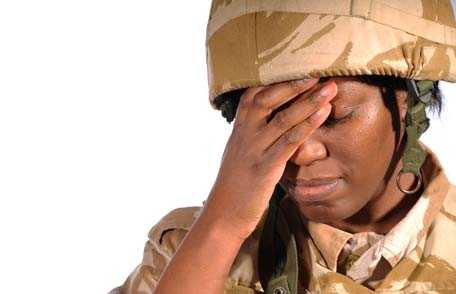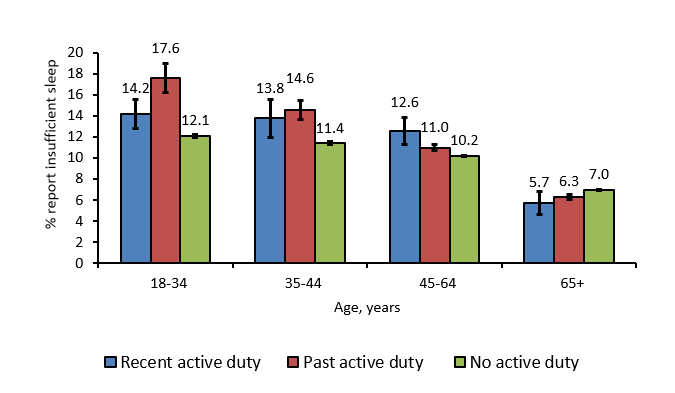Sleep and Military
 Screen for sleep problems among active duty soldiers.
Screen for sleep problems among active duty soldiers.
Insufficient Sleep for Active Duty Soldiers a Big Health Problem
Studies have shown that the military population enters the service comparatively healthy but their health frequently suffers from the onset of sleep disorders.1 Sleep impairments can develop early in training and continue throughout service careers. In one past study, soldiers reported a reduction in sleep from an average of 8 to 9 hours at home to 5 to 6 hours per night during basic combat training.2
A CDC study assessed the prevalence of daily insufficient sleep as a function of military active duty status in the largest population-based survey of US adults.3 The study found that both recent and past active duty service is associated with increased prevalence of insufficient sleep compared to those with no active military service (see Figure 1).

FIGURE 1. Age-specific prevalence of insufficient sleep over the past 30 consecutive days among adults aged ≥18
years, by active duty status: Behavioral Risk Factor Surveillance System, 2009-2010
Other Issues
Other studies report that sleep disturbance may affect career military performance. Lack of sleep effects includes the following:
- Impairments in cognitive function
- Increased confusion
- Fatigue
- Depression
Other studies of sleep conditions among military service personnel include the following:
- Impaired sleep efficiency
- Increased sleep latency
- Snoring
- Sleep-disordered breathing
- Sleep apnea
Health professionals play an important role
Findings from the CDC study suggest that active duty status can have a persistent impact on nightly sleep that lasts at least one year. The long-term effect negatively impacts the health and functioning of these individuals, as well as the conduct of military operations. Screening and treatment of sleep problems may be two effective ways of supporting personnel experiencing symptoms of insufficient sleep.
References
- Shatluck NL, Brown SAT: Wounded in action: what the sleep community can learn from sleep disorders of US military service members. Sleep. 2013;36:159-60.
- Crowley SK, Wilkinson LL, Burroughs EL, et al: Sleep during basic combat training: a qualitative study. Mil Med. 2012;177:823-8.
- Chapman DP, Liu Y, McKnight-Eily, LR., Croft, JB, Holt, JB, Balkin, TJ, Giles, WH. Daily insufficient sleep and active duty status. Mil Med. 2015;180(1):68-76.
More Information
More Information
Learn more about daily insufficient sleep and how it affects health.
- Page last reviewed: December 4, 2015
- Page last updated: February 17, 2015
- Content source:
- National Center for Chronic Disease Prevention and Health Promotion, Division of Population Health
- Page maintained by: Office of the Associate Director for Communication, Digital Media Branch, Division of Public Affairs




 ShareCompartir
ShareCompartir